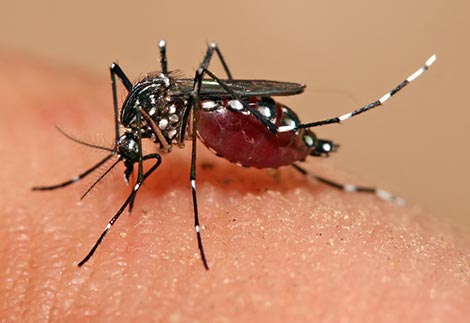The news of Zika virus, a disease-causing pathogen spread to humans through mosquito bites, being found in the U.S. is quickly gaining momentum and receiving national attention from the media as human cases are being confirmed in states across the country, including FL, TX, NY, NJ and more. In addition to the illness associated with the virus, there is great concern about the virus’ potential effect in pregnant women as there is mounting evidence of a link to microcephaly, a congenital condition associated with incomplete brain development in infants.
Zika virus is related to dengue but until recently was thought to have only caused mild symptoms. It was first detected in humans in Uganda decades ago, but there had never been reports of links between the virus and brain malformations until recent months. The Zika virus was found in the brain tissue of babies of two women who experienced miscarriages and two newborns who died. All showed signs of a rare condition known as microcephaly.
Brazil has had over 3,500 babies born with microcephaly since October, compared to 140 for all of 2014. Zika virus has been spreading rapidly through parts of Central and South America. The first cases in Mexico were reported in November and the disease reached Puerto Rico in December, Houston by January, and now San Antonio. As of right now, there have been no cases of locally acquired cases of the Zika virus within the United States. All the cases reported in the US have come from people who had traveled where the Zika virus is endemic.
Currently, there is no vaccine or medication to stop Zika. The only way to avoid catching it is to avoid getting bitten by the Aedes mosquitoes that transmit the infection.
Mosquito Control Experts
We are NOT experts in discussing the virus, nor can we speculate on its potential to spread. However, we ARE experts in mosquitoes and effective mosquito control and can help by educating the public on how to avoid contact with mosquitoes, both while traveling and at home, and how to eliminate mosquito breeding grounds and reduce biting mosquito populations.
Aedes Mosquito
The Zika virus is spread through the bite of an infected Aedes mosquito. This is the same mosquito that carries dengue fever which is closely related to the Zika virus. There is no hard evidence, but speculation is the Asian tiger mosquito might also transmit the disease.
What are the chances of an outbreak in the United States?
While we can’t speculate on the virus and its potential to spread, it is better to be prepared and practice vigilance in mosquito control by protecting yourself from coming into contact with mosquitoes and by eliminating breeding grounds at home should there begin to be cases of local transmission here in the United State. So far, all human cases reported in the U.S. have resulted from travel abroad.
How can I prevent mosquitoes?
- Most counties have a mosquito abatement program in place to minimize the local population and help keep the public safe. These programs typically involve trapping mosquitoes in different areas and testing them for known pathogens. This helps monitor the spread of diseases and warn the public of risks in the area. County programs may also include plans for periodic spraying or fogging to eliminate adult mosquitoes.
- Eliminate areas of standing water around the home such as flowerpots, birdbaths, baby pools, grill covers and other objects where water collects. Mosquitoes lay their eggs in water where the larvae develop and need only about 1/2 inch of water to breed.
- Screen all windows and doors. Repair even the smallest tear or hole.
- Minimize outside activity between dusk and dawn, when the majority of mosquitoes are most active.
- If you must spend time outdoors during peak mosquito times, or when you will be outdoors for extended periods, wear long pants and sleeves and use an insect repellant containing DEET, picaridin, or oil of lemon-eucalyptus.
- It is especially important to wear effective insect repellents and protective clothing if traveling outside the U.S. Mosquito-borne diseases that may be rare in the U.S. are common in many foreign countries.
- If you are concerned about mosquito activity on your property, contact Jenkins Pest & Lawn Services or your local health department.

